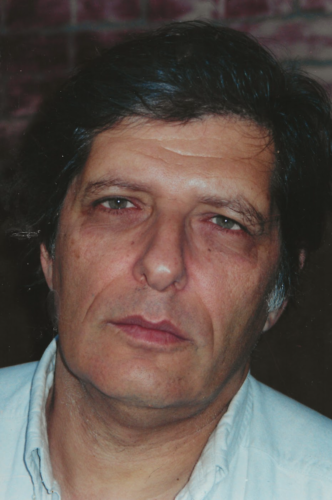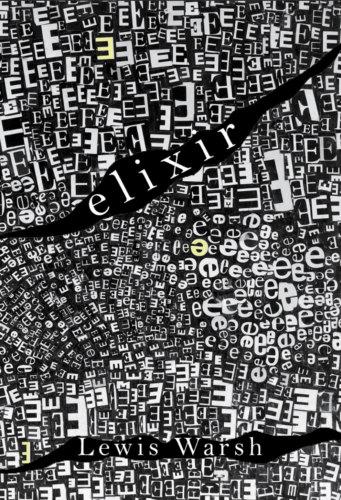What matters most my friends are goneSee their faces, hear them speak“I have so many regrets,” he saidIce cream, he wanted ice creamThe nurse brings me a cup of cold orange sherbetThe first thing I’ve eaten in daysShklovsky’s Third Factory and Alice’s For the RideOn my bedside tableI woke up thinking I was in my own bedShelley, the night nurse, brings me a pitcher of ice waterEveryone has a pathology—I was angry for a long timeAnd I didn’t know whyIn the middle of a fightShe put her hand through a French windowWe had to take a taxi to the ER at St. Vincent’sIt takes years to figure out who you areWhen the surgery is over you open your eyesYou must sign a consent form, you must sign your life awaySoon I will leave the hospital and walk down the street like any strangerOnce I arrived without asking at her house in the middle of night and she let me inThere’s no one around to witness these momentsThere’s no one here except Shelley the night nurseThe last time I was in the hospital my roommate was Lee KonitzHe died soon after—I read it in the newspaperI listened to him sing to himself in his sleepMy roommate was discharged earlier in the day, so I’m aloneVisiting hours 3-7, we’ll talk on the phoneI see all the faces of my friends every dayI met Larry Fagin in the back of Gino & Carlo, a bar in San Francisco, 1963I played chess and drank beer with Lee Harwood in my apartment in Cambridge“You can go home on Friday,” the doctor says, “no reason to stay here any longer”He called Katt after the surgery to assure her everything went wellBill Corbett was the best man at my wedding in the country, 1975You can begin a sentence with a capital letter and end with a period, or notBill Berkson and I embraced one last time outside EJ’s, May 201 6I told Ted Greenwald I would “See him soon” and he said “You better come back tomorrow”The last time I saw Joanne Kyger was after her reading at DIA, “Oh Lewis!I ate lunch with Bill Kushner at Le Grainne and I knew something was wrongI’m writing from Lenox Hill, my bed near the windowSoon the light will come up over the cityThe night nurse, Shelley, will bring me a Percocet, maybe twoAnd no doubt Dr. Newman and his team will visit and the day nurses will arrive“Think of the most beautiful place,” the anesthesiologist says as he puts me underAnd my mind goes blankKatt’s face as I step from the shower and she dries my back and shouldersMy scrawny shoulders Thursday 4 A.M. June 11, 2020
Elixir
Feature Date
- January 23, 2024
Series
Selected By
Share This Poem
Print This Poem
© Katt Lissard, estate of Lewis Warsh, from Elixir by Lewis Warsh (Ugly Duckling Presse, 2022).
Used with permission of Ugly Duckling Presse and The Estate of Lewis Warsh

Lewis Warsh (1944-2020) was a writer, editor, visual artist, educator, and the author of over thirty volumes of poetry, fiction, and autobiography, including The Origin of the World (2001), Inseparable: Poems 1995-2005 (2008), A Place in the Sun (2010), Alien Abduction (2015), Out of the Question: Selected Poems 1963- 2003 (2017), Piece of Cake (2020), and three posthumous works – Elixir (2022) Ugly Duckling Presse: Elixir, Single Occupancy with artist Archie Rand (2023), and the re-issue of his translation of Robert Densnos’ Night of Loveless Nights (2023). He was co-founder, with Bernadette Mayer, of United Artists Magazine and Books United Artists Books, and co-founder and editor, with Anne Waldman, of Angel Hair Books and Magazine and The Angel Hair Anthology (2001). Mimeo Mimeo #7 (2012) was devoted to his poetry, fiction, collages, and a bibliography of his work as a publisher and editor. Grants included The National Endowment for the Arts, The American Poetry Review, and The Poetry Foundation. He taught at Naropa University, The Poetry Project, Pace University, The New School, Bowery Poetry Club, and SUNY Albany. A longtime English Department faculty member at Long Island University (Brooklyn), he was also founding director of their MFA Program in Creative Writing (2007-13). Full bibliography & selected artworks: www.lewiswarsh.com
Elixir is a multi-personaed action movie, a love poem, a trip down memory lane, a Kulchur lexicon, an ode to NYC and tribute to exotic ports everywhere. It’s a tender balm for the paranoid and lonely, and a tentacular tonic for the heart of Time. I loved, once married, and have kept attentive to half a century and more writing of this genius of The Poem. Lewis Warsh opens the doors of perception with wit, suspense, beauty, surprise.
—Anne Waldman
I’ll never forget hearing Lewis Warsh read for the first time, how he kept the room in a trance, at the edge of every line, leaning ever forward. The book was called Inseparable, its poetry driven by an associational logic that is key to the form his work took on over the last few decades. A collage so seamless maybe it’s not, a song drifts in and out the window, changing the view but not the tone, which stays with you as the story keeps shifting stanza by stanza, like life itself. Elixir is the latest collection of this dark and playful work, which has changed my sense of what’s possible in language. This is poetry that comes back to haunt you in the end. My favorite kind.
—Ryan Eckes
Elixir is a stunning final collection of poems by Lewis Warsh, full of jokes, music, melancholic flashes, meanderings, and surprises (“The sunlight on the sand is breathing beneath your skin”). It’s also a practical handbook of possible 21st century poetic forms, with a wide range of lyric prowess enhanced by memory and humor, looking back on seven decades of reading, writing & publishing. New York City is the locus of the page, a place for and of the poem from start to finish, along with a confluence of personal geographies, glimpses of lives and friends in Cambridge and western Massachusetts in the 1970s and San Francisco and Bolinas in the 1960s (“There are many street corners where last / Conversations took place—”). Reading this book I think of David Bowie’s Blackstar and George Harrison’s Brainwashed, where death is acknowledged in the songs, a posthumous masterpiece. A tour de force with an absolutely modern sense of poetry as a living craft.
—Guillermo Parra
I want to talk about how beautiful a book Elixir is, and describe its mastery, and soulfulness, but then I imagine Lewis teasing me about using “mastery,” then teasing the word itself, then placing it in five different phrases to create a tonal scale out of amusement and precision. There are so many layers of possibility Lewis Warsh tended to in his writing, without signaling that he was doing so, which make the poetry inviting and mysterious—steeped in recognition of common experience and wry depths of personal idiosyncrasy. His sense for arrangement of line and sentence across formal vessels that allow everything to be let in and go together is one I’ve loved and learned from for years. To have this book is to have a gift to dive into.
—Anselm Berrigan
Lewis Warsh’s Elixir gathers the fragments of memory: song lyrics, novel titles, oft-repeated phrases whose meanings transform with time. His gentle voice comes through the lines, measuring time by touching the lives and afterlives of every character who walks through his poems—students, workers, neighbors, exes, lovers. Open Elixir to 'look through the keyhole and see who’s there.'
—Lyric Hunter
Lewis Warsh always seemed to have a presence of being on the corner, in the room, out and about, tucked in bed, with a preternatural zen consciousness at play, the slight yet complex humor in his eyes, the old devil cigarette smoke wafting to the sky, a hint of a smile, the profundity of poetry defining his heart. To read these poems is to kick back with Lewis, or to hug him, he loved hugs I think. Poetry is nothing if not the illustration of momentous meditation, a laughing affirmation of lust, and a desire for unknowing. Lewis was cool, forever like that.
—Thurston Moore
Poetry Daily Depends on You
With your support, we make reading the best contemporary poetry a treasured daily experience. Consider a contribution today.




